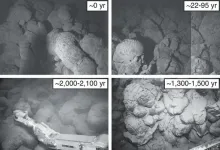(Press-News.org) Novel blood testing technology being developed by researchers at the Johns Hopkins Kimmel Cancer Center that combines genome-wide sequencing of single molecules of DNA shed from tumors and machine learning may allow earlier detection of lung and other cancers.
The test, called GEMINI (Genome-wide Mutational Incidence for Non-Invasive detection of cancer), looks for changes to DNA throughout the genome. First, a blood sample is collected from a person at risk for developing cancer. Then, cell-free DNA (cfDNA) shed by tumors is extracted from the plasma and sequenced using cost-efficient whole genome sequencing. Single molecules of DNA are analyzed for sequence alterations and are used to obtain mutation profiles across the genome. Finally, a machine learning model trained to identify changes in cancer and non-cancer mutation frequencies in different regions of the genome is used to distinguish people who have cancer from those who do not have cancer. The classifier generates a score ranging from 0 to 1, with a higher score reflecting a higher probability of having cancer.
In a series of laboratory tests of GEMINI, investigators found that the approach, when followed by computerized tomography imaging, detected over 90% of lung cancers, including among patients with stage I and II disease. A description of the work, a proof-of-concept study, was published online July 27 in the journal Nature Genetics.
“This study shows for the first time that a test like GEMINI, incorporating genome-wide mutation profiles from single molecules of cfDNA, in combination with other cancer detection approaches, may be used for early detection of cancers, as well as for monitoring patients during therapy,” says senior study author Victor Velculescu, M.D., Ph.D., professor of oncology and co-director of the cancer genetics and epigenetics program at the Kimmel Cancer Center.
The study mostly focused on detection of lung cancer in high-risk populations, says Daniel Bruhm, lead study author and graduate student in the human genetics program at the Johns Hopkins University School of Medicine. “However, we detected altered mutational profiles in cfDNA from patients with other cancers, including liver cancer, melanoma or lymphoma, suggesting it may be used more broadly,” Bruhm says.
To develop GEMINI, investigators examined whole-genome sequences of cancers from 2,511 people across 25 different cancers from the Pan-Cancer Analysis of Whole Genomes study, identifying distinct mutation frequencies across the genome in different tumor types. For example, lung cancers were found to have an average of 52,209 somatic mutations per genome. The investigators also identified genomic regions with the highest number of mutations, finding that genome regions with a high frequency of mutations were similar between tumor tissue and blood-derived cfDNA from patients with lung cancer, melanoma or B cell non-Hodgkin lymphoma.
Researchers evaluated GEMINI’s ability to detect sequence alterations in cfDNA from 365 people in the Longitudinal Urban Cohort Ageing Study (LUCAS), a cohort of people at high risk of having lung cancer. GEMINI scores were higher in people with cancer than in those without cancer. Researchers also assessed whether GEMINI could be combined with DELFI (DNA evaluation of fragments for early interception) — a previously developed test that detects changes in the size and distribution of cfDNA fragments across the genome — to improve detection of early-stage lung cancer. Several cancer samples that GEMINI missed were detected using the combined technique. In 89 samples from patients from the LUCAS cohort who had lung cancer, GEMINI combined with DELFI correctly detected cancers 91% of the time. Similar results were obtained in a separate validation cohort of 57 people who mostly had early-stage lung cancer.
The investigators also studied the use of GEMINI in other study samples, including seven patients who did not have any detectable tumors at the time of blood collection. They had a median GEMINI score of 0.78, which is higher than people without cancer. Six tested positive using GEMINI and were later diagnosed with lung cancer from 231 to 1,868 days after samples were obtained, suggesting that abnormalities in cfDNA mutation profiles can be detected years before standard diagnoses.
Additional experiments determined that GEMINI could distinguish between subtypes of lung cancers and could detect early liver cancers. In a group of patients receiving lung cancer drug treatment, GEMINI scores decreased during initial response to therapy, suggesting the testing could be used to monitor patients during therapy.
Together, the results indicate that the combination of genome-wide GEMINI mutation analyses and DELFI fragmentation analyses of cfDNA “may provide an opportunity for cost-efficient, scalable detection of cancers,” says Rob Scharpf, Ph.D., associate professor of oncology at the Kimmel Cancer Center. Larger clinical trials are needed to validate the tool before it could become available for clinical use, he says.
Additional study co-authors include Dimitrios Mathios, Zachariah Foda, Akshaya Annapragada, Jamie Medina, Vilmos Adleff, Elaine Jiayuee Chiao, Leonardo Ferreira, Stephen Cristiano, James White, Amy Kim, Valsamo Anagnostou and Jillian Phallen of Johns Hopkins. Other authors are from Boston University and the Allegheny Health Network Cancer Institute in Pittsburgh.
The work was supported in part by the Dr. Miriam and Sheldon G. Adelson Medical Research Foundation, the Stand Up to Cancer (SU2C) InTime Lung Cancer Interception Dream Team Grant, the SU2C-Dutch Cancer Society International Translational Cancer Research Dream Team Grant (SU2C-AACR-DT1415), the Gray Foundation, the Commonwealth Foundation, the Mark Foundation for Cancer Research, the Cole Foundation, a research grant from Delfi Diagnostics and U.S. National Institutes of Health grants CA121113, CA006973, CA233259, CA062924 and 1T32GM136577.
Bruhm, Mathios, Cristiano, Phallen, Scharpf and Velculescu are inventors on patent applications submitted by The Johns Hopkins University that are related to cfDNA use for cancer detection. Cristiano, Phallen, Adleff, Scharpf and Velculescu are founders of Delfi Diagnostics, and Adleff and Scharpf are consultants for this organization. Velculescu also serves on the board of directors and is an officer for Delfi Diagnostics, and he owns stock in the business. White is the founder and owner of Resphera Biosciences. Additionally, The Johns Hopkins University owns equity in Delfi Diagnostics. Velculescu is an inventor on patent applications submitted by Johns Hopkins related to cancer genomic analyses and cfDNA for cancer detection that have been licensed to various entities. Under these license agreements, the university and inventors are entitled to fees and royalty distributions. Velculescu is an adviser to Viron Therapeutics and Epitope. These arrangements have been reviewed and approved by The Johns Hopkins University in accordance with its conflict-of-interest policies.
DOI: 10.1038/s41588-023-01446-3
END
Novel machine learning blood test detects cancers with genome-wide mutations in single molecules of cell-free DNA
2023-08-04
ELSE PRESS RELEASES FROM THIS DATE:
Research reveals Hawai‘i’s undersea volcano, Kama‘ehu, erupted five times in past 150 years
2023-08-04
Kamaʻehuakanaloa (formerly Lōʻihi Seamount), a submarine Hawaiian volcano located about 20 miles off the south coast of the Big Island of Hawai‘i, has erupted at least five times in the last 150 years, according to new research led by Earth scientists at the University of Hawai‘i at Mānoa. For the first time, scientists were able to estimate the ages of the most recent eruptions of Kamaʻehu, as well as the ages of eight additional older eruptions at this volcano going back about 2,000 years. Their findings were published recently in Geology.
Hawaiian volcanoes are thought to transition through a series of growth stages. ...
Insulin-like hormones critical for brain plasticity
2023-08-04
Research from the Max Planck Florida Institute for Neuroscience has identified a mechanism through which insulin-like growth factors facilitate brain plasticity.
The insulin superfamily of hormones, including insulin, insulin-like growth factor 1 (IGF1), and insulin-like growth factor 2 (IGF2), play a crucial role not only in regulating blood sugar, metabolism, and growth, but also in healthy brain development and function, including learning and memory. These hormones can enter the brain through the bloodstream from the liver or can be synthesized directly in neurons and glial cells within the brain. They bind to receptors, ...
A mother’s diet can protect her grandchildren’s brains: genetic model study
2023-08-04
Mothers who eat apples and herbs in early pregnancy could be protecting the brain health of their children and grandchildren, a Monash University study using genetic models has found.
The discovery is part of a project that found a mother’s diet can affect not just her child’s brain but also those of her grandchildren.
Published in Nature Cell Biology, the Monash Biomedicine Discovery Institute study found that certain foods could help protect against the deterioration of brain function.
More specifically, the study used roundworms (Caenorhabditis elegans) as the genetic model because many of ...
Study examines Earth and Mars to determine how climate change affects the paths of rivers
2023-08-04
In a new study published in Nature Geosciences, researchers, led by a Tulane University sedimentologist , investigated why the paths of meandering rivers change over time and how they could be affected by climate change.
Chenliang Wu, PhD, a postdoctoral researcher at Tulane University School of Science and Engineering, began this research by looking at the Mississippi River before adding other rivers on Earth and ancient riverbeds on Mars to the study.
The study specifically looks at river sinuosity, or how much rivers curve. The sinuosity of rivers changes over time, depending on the age of the river and environmental changes. Some of these changes ...
MSU scientists help discover the highest-energy light coming from the sun
2023-08-03
EAST LANSING, Mich. – Sometimes, the best place to hide a secret is in broad daylight. Just ask the sun.
“The sun is more surprising than we knew,” said Mehr Un Nisa, a postdoctoral research associate at Michigan State University. “We thought we had this star figured out, but that’s not the case.”
Nisa, who will soon be joining MSU’s faculty, is the corresponding author of a new paper in the journal Physical Review Letters that details the discovery of the highest-energy ...
Outdoor air pollution may increase non-lung cancer risk in older adults
2023-08-03
Key points:
A cohort study of millions of Medicare beneficiaries found that chronic exposures to PM2.5 and NO2 over a 10-year period increased the risk of developing colorectal and prostate cancers.
Even in areas with low pollution levels, researchers found substantial associations between exposures to these pollutants and the risk of developing colorectal and prostate cancers, in addition to breast and endometrial cancers.
For immediate release: August 3, 2023
Boston, MA—Chronic exposure to fine particulate air pollutants (PM2.5) ...
University of Minnesota-led study links long-term artificial sweetener intake to increased body fat adipose tissue volume
2023-08-03
MINNEAPOLIS/ST. PAUL (08/03/2023) — Published in the International Journal of Obesity, University of Minnesota Medical School and School of Public Health researchers led a study on the relationship between dietary intake and cardiovascular disease risk factors.
Over 20 years, the research team examined people's regular dietary intake, paying particular attention to non-nutritive sweeteners commonly found in artificial sweeteners. They found that long-term consumption of aspartame, saccharin and diet beverages were linked to increased fat stores in the abdomen and fat within muscle. However, ...
Deep learning for new protein design
2023-08-03
The key to understanding proteins — such as those that govern cancer, COVID-19, and other diseases — is quite simple. Identify their chemical structure and find which other proteins can bind to them. But there’s a catch.
“The search space for proteins is enormous,” said Brian Coventry, a research scientist with the Institute for Protein Design, University of Washington and The Howard Hughes Medical Institute.
A protein studied by his lab typically is made of 65 amino acids, and ...
Scientists uncover a startling—and exploitable—coordination of gene expression in tumors
2023-08-03
AUGUST 3, 2023, NEW YORK – A Ludwig Cancer Research study has identified a pair of genes whose expression by a type of immune cell within tumors is predictive of outcomes for cancer patients and is linked to a vast network of gene expression programs, engaged by multiple cell types in the tumor microenvironment, that control human cancers.
Researchers led by Ludwig Lausanne’s Mikaël Pittet report in the current issue of Science that patients with higher expression of the gene CXCL9 in their tumor-associated macrophages had far better clinical outcomes than those with higher expression of a gene named SPP1 by the immune cells. Macrophages expressing the former ...
Fatal heart disease has plummeted since 1990, but progress has stalled
2023-08-03
After decades of decline, fatal coronary heart disease may rise again unless Americans modify three major risk factors: smoking, drinking, and obesity.
A Rutgers study just published in American Heart Journal found that deaths from coronary heart disease among people ages 25 to 84 dropped to 236,953 in 2019 from 397,623 in 1990, even though Americans’ median age increased to 38 from 33 over the last three decades.
Between 1990 and 2019, the US age-standardized coronary heart disease mortality rate per 100,000 fell from 210.5 to 66.8 for females (4 percent decline per year) and from 442.4 to 156.7 for males (3.7 percent decline per year). However, the decline has slowed significantly ...





